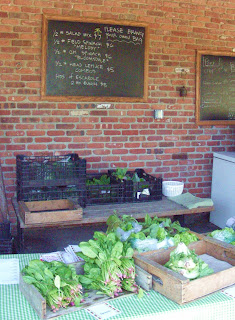Although I haven't eaten at the location in Manhattan, I did eat at the one in Pocantico Hills (Hudson River Valley near Tarrytown) last weekend. I'm not sure how similar or different they are--the one outside the city is on a farm, so you have the advantage of touring the pastures, gardens, and greenhouses to really see where your food is coming from, but I would imagine the menu selections and format are similar. Both my spouse and I agreed that it was the most unique meal we've ever had, although not the best meal we've ever had (those accolades would go to either Per Se or The French Laundry). Blue Hill was half the price, though, so it's hard to be disappointed, and if I had to say anything negative, it would be that they are serving a larger number of people per day/night, so the service is just a tad lacking, or inconsistent perhaps (sometimes we had several servers at our table, and at other times they were nonexistent). You have your choice of a 5-course tasting menu or an 8-course menu, so plan on a lengthy dinner. My other somewhat negative comment is that the servers didn't describe each dish adequately--they mentioned the main ingredient, but not the minor components, and I wanted to know everything since the tastings were completely blind.
In spring of 2004, Blue Hill at Stone Barns opened at Stone Barns. The restaurant sources many ingredients from Stone Barns fields and pastures. Its executive chef and co-owner is Dan Barber, who also owns Blue Hill in New York City. Stone Barns' property was once part of Pocantico, the Rockefeller estate. The stone barns themselves were commissioned by John D. Rockefeller, Jr. to be a dairy farm. The complex fell into disuse during the 1950s and was mainly used for storage. In the 1970s, agricultural activity resumed when David Rockefeller's wife Peggy began a successful cattle breeding operation. Stone Barns Center for Food and Agriculture was created by David Rockefeller, his daughter Peggy Dulany, and their associate James Ford as a memorial for Peggy Rockefeller, who died in 1996. Stone Barns opened to the public in May 2004. The farm at Stone Barns Center is a four-season operation with approximately 6 acres used for vegetable production. It uses a six-year rotation schedule in the field and greenhouse beds. The farm grows 200 varieties of produce year-round, both in the outdoor fields and gardens and in the 22,000-square-foot minimally heated greenhouse that capitalizes on each season’s available sunlight. Among the crops suitable for the local soil and climate are rare varieties such as celtuce, suiho, hakurei turnips, New England Eight-Row Flint seed corn and finale fennel. The farm uses no pesticides, herbicides or chemical additives, although compost is added to the soil for enrichment. The farm has a six-month composting cycle using manure, hay, and scraps from Blue Hill at Stone Barns. Stone Barns Center raises chickens, turkeys, geese, sheep, pigs and bees suited to the local ecosystem. The livestock farmers try to raise animals in a manner consistent with the animals' evolutionary instincts. The chickens, turkeys, sheep and geese are raised on pastures kept healthy and productive through carefully managed rotational grazing. The sheep and pigs’ bedding packs are regularly turned and composted. Farmers who raise animals in this fashion are frequently called "grass farmers" because there is so much emphasis on the health of the pastures. Strategies for maintaining the pastures include intensive paddock management so the grazed area has ample time to recover and provide a natural refuge for birds and other wildlife, essential for the maintenance of ecological balance.

















No comments:
Post a Comment